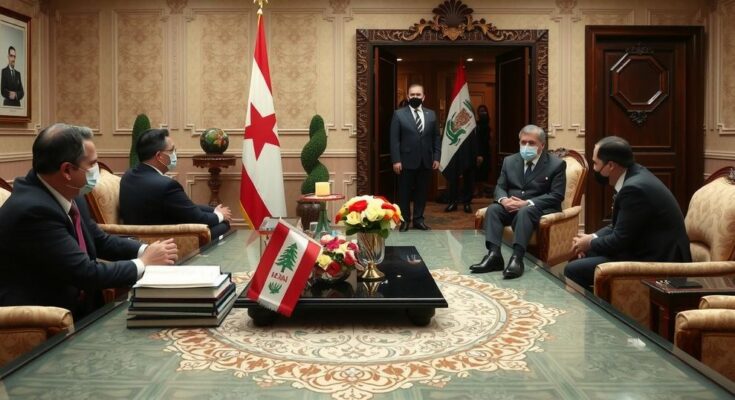Lebanon’s caretaker Prime Minister Najib Mikati will visit Syria’s leader Ahmed al-Sharaa in Damascus, marking the first such visit in 15 years and the first since the downfall of Bashar al-Assad. This meeting could indicate a shift toward improved diplomatic relations between the neighboring nations, as President Joseph Aoun calls for serious dialogue.
Najib Mikati, Lebanon’s caretaker Prime Minister, is slated to meet Syrian de facto leader Ahmed al-Sharaa in Damascus on Saturday. This meeting marks a significant diplomatic moment, as it will be the first time a Lebanese head of government has visited Syria’s capital following the regime of Bashar al-Assad. It is also worth noting that this will be the first visit of a Lebanese premier to Syria in 15 years.
President Joseph Aoun of Lebanon stated that there exists a historic opportunity for “a serious and equal dialogue” between Lebanon and Syria, reflecting a shift in relations between the neighboring nations that have been strained for decades. The Syrian influence in Lebanon was pervasive during the Assad regime, maintaining military presence until 2005, a situation that was met with considerable opposition from many Lebanese citizens.
Ahmed al-Sharaa, who has led the Islamist factions that helped displace Assad’s government, assured Lebanese politicians earlier that Syria would not interfere in the internal affairs of Lebanon. In anticipation of the visit, Mikati received an invitation from Sharaa, and is expected to be accompanied by Lebanese caretaker Foreign Minister Abdallah Bou Habib, who has expressed a desire for strengthened neighborly relations. The last Lebanese Prime Minister to visit Damascus was Saad al-Hariri in 2010.
The relationship between Syria and Lebanon has been complicated throughout history, particularly since both nations gained independence in the 1940s. Hezbollah’s significant support for Assad during the Syrian civil war further complicated these relations, as the group fought against the insurgents who challenged Assad’s rule. The 2005 assassination of former Lebanese Prime Minister Rafik al-Hariri, which resulted in mass protests and demanded the end of Syrian military presence in Lebanon, marked a pivotal moment and strained relations even further.
Despite historical tensions, the recent overtures from both sides suggest a potential thawing in relations, offering a path towards dialogue that may reshape the future dynamics between Lebanon and Syria.
The relationship between Lebanon and Syria has been historically complex and fraught with tension. Following the civil war in Lebanon from 1975 to 1990, Syria intervened militarily and occupied the country for 15 years. The assassination of Rafik al-Hariri in 2005 triggered widespread protests against Syrian influence, resulting in Syria’s withdrawal from Lebanon. Since then, diplomatic relations have remained strained, although recent developments indicate that both countries may seek to re-establish their dialogue regarding mutual interests.
In conclusion, Prime Minister Najib Mikati’s upcoming visit to Syria represents a significant diplomatic initiative aimed at mending and redefining Lebanon’s relationships with its neighbor. With the potential for renewed cooperation and dialogue, this meeting could provide a platform for addressing historical grievances and exploring ways to ensure regional stability. As both nations navigate their complex past, the outcome of these discussions may pave the way for improved relations moving forward.
Original Source: www.newarab.com




